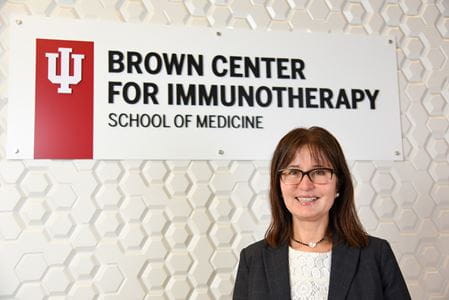INDIANAPOLIS—Indiana University School of Medicine has named its first executive director of the Brown Center for Immunotherapy. Huda Salman, MD, PhD will become the center’s new leader, effective November 1.
Salman joins IU School of Medicine from Stony Brook University and Stony Brook Cancer Center where she is currently an associate professor, section chief of hematological malignancies and director of the CAR T-cell program. She founded the hematological malignancies section as well as the Cancer Center Adolescence and Young Adult Program at Stony Brook. She completed a fellowship in hematology/oncology at Albert Einstein College of Medicine, residency at Cornell Medical College and medical school at Jordan University. A leukemia survivor herself, Salman’s clinical expertise is focused on hematological malignancies and bone marrow transplantation and cellular therapy, particularly for acute and aggressive lymphomas. Her most recent work on CAR T-cell and immunotherapy is extramurally funded and very well received in the medical community.
At IU School of Medicine, Salman will hold the title of Don Brown Chair in Immunotherapy and professor of medicine in the Department of Medicine, Division of Hematology and Oncology.
“I’m excited to join IU and focus on cancer immunology research and immunotherapy,” Salman said. “This is a great opportunity to establish new treatments through basic, translational and clinical research in collaboration with other IU faculty and existing programs as well as across the country. I’m also looking forward to building a dedicated team of scientists and clinicians to advance the field in this area of medicine.”
The Brown Center for Immunotherapy was established in 2016 thanks to a $30 million gift from Indianapolis entrepreneur Donald E. Brown, MD. The center studies new ways to deploy immune-based therapies to treat cancer and pioneer use of technology in other diseases. Currently, researchers are focused on a technology known as chimeric antigen receptor-modified T-cells, or CAR T-cells. T-cells are important cells in the body’s immune system, but often cannot detect cancer cells due to the defenses put up by the malignant tumor cells. The immunotherapy approach is based on harnessing the immune system to fight cancer cells. In CAR T-cell therapy, the patient’s T-cells are collected, genetically re-programmed to more efficiently identify and attack cancer cells, then re-infused back into the patient.
“Immunotherapy represents one of the most promising advances in recent decades, if not in the entire history of medicine,” said Jay L. Hess, MD, PhD, MHSA, executive vice president for university clinical affairs and IU School of Medicine dean. “We are excited to welcome Dr. Salman as the Brown Center’s inaugural director and look forward to the new advancements the center will make under her leadership.”
The center is part of the IU Melvin and Bren Simon Comprehensive Cancer Center, a National Cancer Institute-designated Comprehensive Cancer Center with more than 250 investigators who work to develop better approaches to prevention, diagnosis and treatment of cancer. The Brown Center also collaborates with the private sector throughout Central Indiana, including leaders in pharmaceuticals, biotechnology and other relevant fields.
“Dr. Salman will recruit and lead a team of scientists to improve the application of adult and pediatric cancer cell therapy and pioneer the use of this powerful technology for other diseases,” said Kelvin Lee, MD, director of the cancer center and associate dean for cancer research at IU School of Medicine. “With her years of expertise, we are confident that she will help the Brown Center continue its important work to develop methods to make this highly-specialized therapy more widely accessible to make the greatest impact on patients’ lives.”
The Brown Center for Immunotherapy is focused on multiple myeloma and triple negative breast cancer, two diseases for which the School of Medicine and its clinical partner Indiana University Health have a strong foundation of talent, sizable patient populations and existing resources that can be leveraged to maximize impact. Researchers will also investigate potential opportunities to prevent and treat Alzheimer’s disease and other neurodegenerative disorders with immunotherapies.
###
IU School of Medicine is the largest medical school in the U.S. and is annually ranked among the top medical schools in the nation by U.S. News & World Report. The school offers high-quality medical education, access to leading medical research and rich campus life in nine Indiana cities, including rural and urban locations consistently recognized for livability.




